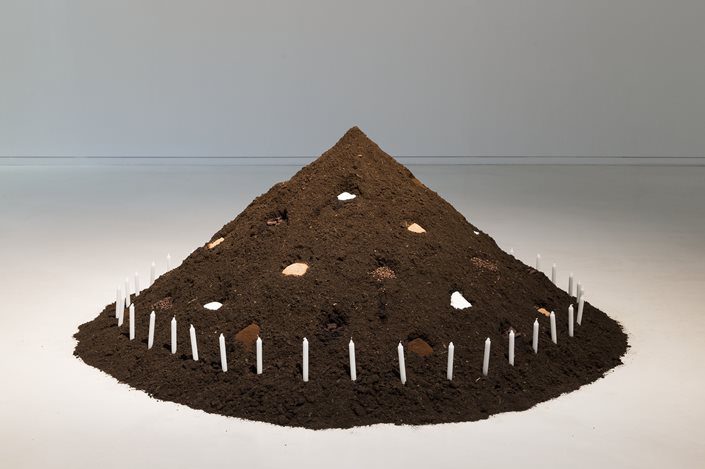The Power Plant, Toronto, Canada
23 Jun 2018 - 03 Sep 2018

Grada Kilomba, Table of Goods, 2017, Installation view: MAAT – Museum of Art, Architecture and Technology, Lisboa. Courtesy the artist and EDP Foundation. Photo: Bruno Lopes.
The Power Plant presents Grada Kilomba’s first solo exhibition in North America.
There is an apprehensive fear that if the colonial subject speaks, the colonizer will have to listen. She/he would be forced into an uncomfortable confrontation with “Other” truths. Truths that have been denied, and kept quiet, as secrets. I do like this phrase “quiet as it’s kept.” It is an expression of African Diasporic people that announces how someone is about to reveal what is presumed to be a secret. Secrets like slavery. Secrets like colonialism. Secrets like racism. (Grada Kilomba)
Grada Kilomba’s work addresses issues of gender and race, trauma and memory, in the context of the current debates on colonialism and post-colonialism and as research into the ambiguous relationship between remembering, forgetting, and the collective memory and identity of Africans living in diaspora. Evoking African oral traditions and their power to carry on the spoken word, the artist’s work gives voice to silenced narratives with the aim of rewriting and retelling a history that has been suppressed or disregarded.
Showing her work for the first time in North America, the exhibition Secrets to Tellpresents The Desire Project (2015–2016). Divided into three acts, like a theatre play — “While I Walk”, “While I Speak” and “While I Write” — the three-channel projection features a rhythmic sequence of sentences that composes a powerful discourse engaged in the decolonisation of contemporary thought. The projections are accompanied by a shrine dedicated to Escrava Anastacia, a political and religious figure popularised by the Brazilian African movement in the 18th century.
Alongside The Desire Project, the exhibition features a new version of the staged reading of Kilomba’s book Plantation Memories (2008) – a compilation of episodes of everyday racism written in the form of short psychoanalytical stories and testimonials told by women of African diaspora. In the wall piece The Chorus, Kilomba introduces the idea of a manifesto based on their words. Kosmos2, Labor #10: Video Installation(2015-ongoing), documents a conversation between Kilomba and Diana McCarty, who discuss the urgent need for new artistic practices that distance themselves from the norms of dominant narratives.
Kilmoba’s new work, Table of Goods (2017), establishes a direct relationship between the shrine dedicated to Anastacia and Brazil’s history of slavery, sexual violence and exploitation. Made with soil, sugar, coffee, cocoa, chocolate and wax candles, Table of Goods reminds us that the exchange of goods within our global, capitalist system is inextricably linked to our colonial past and present.
The exhibition Secrets to Tell is accompanied by a fully illustrated book with texts by Inês Grosso and Alfredo Jaar, and a conversation between Theresa Sigmund and Grada Kilomba.
The exhibition is a production of MAAT – Museum of Art, Architecture and Technology/Fundação EDP, Lisbon in partnership with The Power Plant, Toronto.
Grada Kilomba (1968, Lisbon, Portugal) lives and works in Berlin. Solo exhibitions of Kilomba’s work have been organized at Avenida da Índia Gallery, at the Municipal Galleries of Lisbon (2017), and MAAT – Museum of Art, Architecture and Technology, Lisbon (2017). Her work has been shown in numerous group exhibitions around the world, including dOCUMENTA14, Kassel (2017); the 32nd São Paulo Biennial (2016); and Rauma Biennal Balticum, Finland (2016). She has performed in venues such as SAVVY Contemporary Berlin (2017); the Secession Museum, Vienna (2016); Münchner Kammerspiele, Munich (2016); the Bozar Museum for Contemporary Art, Brussels (2016); SOAS University of London, UK (2016); and Wits Theatre, Johannesburg (2016). Kilomba is the author of the book Plantation Memories: Episodes of Everyday Racism (2008) and co-organizer of Mythen, Subjekte, Masken(2005), an interdisciplinary anthology of critical studies on whiteness. She earned a PhD in philosophy from Freie Universität Berlin in 2008 and has taught at various international universities, including the Humboldt-Universität zu Berlin where she was an Associate Professor until 2013.
.
Public Opening: Friday, 22 June 2018, 8 – 11 PM
.